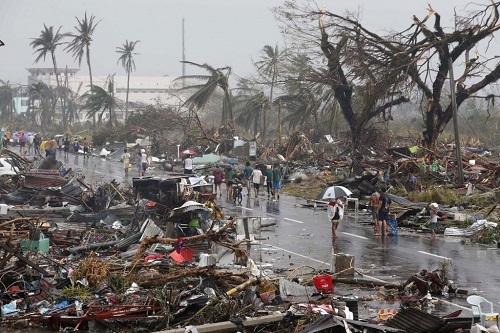Reuters photo
By
Jose Kalathil
Movers and seekers participating in the Sixth Asia-Pacific Climate Change Adaptation Forum organised by the United Nations Environment Programme–Asia-Pacific Adapatation Network (UNEP-APAN) called for creating awareness on Climate Change to make the world a better and safer place to live in.
In his keynote address delivered live from Stockholm, Anand Patwardhan, Director General, International Centre for Climate Change and Development said that exchange of knowledge among countries is the key to the adaptation of climate change. He was happy that delegates from about 60 countries and from international organisations were participating in the three-day event, co-hosted by the Climate Change Commission, Philippines, the Government of the Republic of Palau, and the Asian Development Bank on the theme, ‘Enabling Resilience For All: Avoiding the Worst Impacts’.
Held for the sixth time since 2010, this Climate Change Forum is organized by the Asia Pacific Adaptation Network (APAN), which is a regional programme for managing and applying adaptation knowledge in the region, and supports governments and other organisations working on adaptation.
So many unpredictable things are happening around the world like floods and droughts which are slowly bleeding our economies too. Such threats and vulnerability should be shared by all.
One expert said that several policies have been taken on Climate Change across the world. Nepal, Bangladesh and Sri Lanka are some countries that have taken action. “We have to ensure the full security of people.”
To this end, yesterday, a global adaptation commission was formed in the Netherlands. It was also said that the impact of climate change will hit the poor and the marginalised the most.
The 6th Forum focuses on four “streams”; (i) resilience of social and human systems, (ii) resilience of natural systems, (iii) resilience of industry and the built environment, and (iv) resilience of island communities. The inclusion of islands recognizes that Asia and the Pacific’s numerous and diverse island communities face particular challenges associated with economic shocks and natural hazards, and building resilience is often an existential task.
The Forum also address the capacity building needs and priority issues in the Asia Pacific regions that would enable the scaling of tools and the means to resilience that will equip our human systems and communities with the capacity to withstand and moderate the worst-case scenarios.
It will facilitate the “how” part of adaptation knowledge and programmes, with actionable, scalable “next step” guidelines for communities, stakeholders, and governments. In addition it will report on the specific actions taken since the last APAN Forum regarding progress on addressing the priority knowledge, policy and funding gaps and act as a platform for discussions and outcomes that would accelerate action and provide the basis for complementary and concrete groundwork for the 2018 Global Stocktake facilitative dialogues, as well as for both ASEAN and Pacific country contributions leading to COP 24 in Katowice, Poland at the end of the year.
Climate Change is anticipated to have an increasing impact on human health, security, livelihoods, and poverty levels in Asia and the Pacific. Warming trends and temperature extremes have been observed throughout the region, whilst water scarcity is expected to become a major challenge. Food productivity and human security is projected to decline in many Asian countries, while rising sea levels are likely to lead to further coastal erosion. For the low lying islands of the Pacific, sea level rise is a significant Climate Change threat, impacting livelihoods, infrastructure, agriculture and water resources. Outbreaks of malaria and dengue are increasing in frequency. Both climatic and non-climatic drivers are affecting the extreme vulnerability of the Pacific region.
“Be prepared to survive through the impacts of climate change”
“Adaptation ensures that we, as a people, are prepared and resilient enough to survive through the impacts of climate change with our culture and identity intact for generations to come,” said the President of Palau Thomas E. Remengesau, Jr. in his message to the participants of the 6th Asia-Pacific Climate Change Adaptation Forum, being held in Manila.
“We need to find solutions to pave the road for a resilient society, economy, and ecosystem using platforms from Asia and the Pacific,” said Mr. Yasuo Takahashi, Vice-Minister for Global Environmental Affairs of Japan’s Ministry of the Environment.
The Asia-Pacific Climate Change Adaptation Forum is the flagship event of the Asia Pacific Adaptation Network (APAN) and gives delegates the opportunity to forge partnerships and share learnings from actions, cutting edge science, and practical solutions that will strengthen resilience. The forum also helps establish regional priorities and mobilize political support for the international climate conference (COP24) in Katovice, Poland in December 2018.
“There is increasing prevalence of climate change and disaster risks in our cities and local communities. The poor and the marginalized are bound to suffer the most,” said Philippine Climate Change Commission Secretary Mr. Emmanuel M. De Guzman. “Reducing disaster risk and adapting to climate change is a pro-poor response. It liberates the poor from the vicious cycle of poverty and risk. It is social justice in action,” he added.
“Climate change, with its wide-ranging and largely adverse impacts, has emerged as a new threat to the continuing sustainable development of the region, with the potential to undermine five decades of progress,” said ADB Vice-President for Knowledge Management and Sustainable Development Mr. Bambang Susantono. “For ADB, to help achieve the development objectives of this region, investing in building resilience to climate and disaster risks has to be a new norm.”
“Climate change resilience is imperative for the Asia-Pacific region. We have no choice but to adapt,” said UN Environment Regional Director for Asia and the Pacific, Ms. Dechen Tsering. “Fortunately, here in Asia, we have the tools and insight to do so. The APAN Forum builds partnerships to share this knowledge.”
Co-hosted by the Government of Palau, the Philippine Climate Change Commission, and ADB, together with the APAN secretariat at UN Environment, the forum is the largest gathering of adaptation practitioners in the Asia and Pacific region. This year’s theme is “Enabling Resilience for All: Avoiding the Worst Impacts” and features interactive sessions, panel discussions, and knowledge exchange.
Jose Kalathil
Jose Kalathil is a senior journalist based in New Delhi. With more than three decades of experience in India and abroad, he is comfortable writing on any subject under the sun. He may be contacted at [email protected]



No Comments Yet!
You can be first to comment this post!